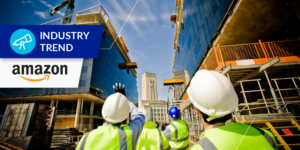
Amazon is hitting the pause button on the construction of six office spaces in Bellevue, Washington, and Nashville, Tennessee, noting that the decision was made so that the buildings could be reevaluated and potentially redesigned to better suit hybrid work.
“The [coronavirus] pandemic has significantly changed the way people work,” said John Schoettler, vice president of global real estate and facilities at Amazon. “Our offices are long-term investments and we want to make sure that we design them in a way that meets our employees’ needs in the future.”
Though the buildings’ exteriors will be completed, the interiors will be reevaluated and completed at a later date as the company figures out how it wants to proceed with new workspaces.
Amazon is a big name currently serving as a notable example of changing approaches to new construction in the corporate world — but they’re far from the only ones who are thinking about how changing attitudes to the work-life balance may end up impacting their plans for long-term expansion.
Just last week, Meta confirmed their very similar plan to delay the buildout of 250,000 square feet of office space in Cambridge, MA in order to redesign it for hybrid work — this coming just seven months after signing the lease for the space.
“One of the biggest names in tech is pausing its Boston-area expansion plans, the latest sign that working from home may be here to stay, even for companies that made pandemic-era bets on the office,” reported Catherine Carlock for The Boston Globe.
Additionally, in mid-July, Meta ended its pursuit of 300,000 square feet of additional office space in New York City.
“There are often a number of reasons why we wouldn’t proceed with a particular deal, including office utilization,” a Meta representative said at the time. “The past few years have brought new possibilities around the ways we connect and work.”
Amazon has also made a similar move with its New York City offices, choosing to lease less space than originally intended at Hudson Yards.
This doesn’t automatically mean that companies are pulling back on the construction of office space, but it is certainly signaling a desire to rethink what these spaces are. Just as Amazon has done with its recent reappraisal of its space, other companies are taking on projects that embrace a different kind of work-life balance.
“For our corporate and tech roles, we’ve adopted a hybrid model that offers employees increased flexibility — each team decides the balance between in-office and remote work that makes sense for them,” Schoettler noted, recognizing the need for a reappraisal of the way that employees play a part in the spaces they work in.
Even where employers recognize the areas where hybrid work is important for employees, industry leaders are pointing out that the construction workplaces that legitimately allow for hybrid work requires planning that goes beyond simply allowing people to work from home.
“If you’re not going to offer something that fits [workers’] lifestyles, why should they come back to work?” said Andrew Jacobson, head of US development for Vancouver, British Columbia developer Westbank Corp., which is moving forward on a new project building both living spaces and office spaces for workers within walking distance of each other.
Even those who are pushing forward with certain projects acknowledge that the eagerness to build office spaces isn’t universal — even within the companies themselves. For example, though developer Boston Properties is pushing forward on a new workspace project in San Jose, company president Douglas Linde was careful to note that “You don’t see, other than our San Jose [project,] us announcing major office developments at the moment.”
Playing into the shift of employee lifestyles and location is the uptick in residential construction outside of major metropolitan areas that the country has seen in the aftermath of the pandemic. Major cities like New York and Los Angeles are losing residents to smaller metro areas like Raleigh, NC or Jacksonville, FL — and those former city-dwellers are often taking their jobs with them.
Hybrid and remote work has made it so that many workers are able to relocate to areas where it’s more affordable and reasonable to build new single-family residences while still remaining at their jobs. As the emphasis has grown on more available living space, this has taken focus away from expansion and new construction of office spaces.
Of course, there are some places where growth is returning organically to the corporate sector, and potentially heralding major new expansion as well.
Columbus, Ohio commercial real estate analysts Newmark noted that the city has had three straight quarters of positive growth with office space leases, as well as nearly 1.25 million square feet of projects under construction in the city that are expected to be finished within the next year.
“I’m surprised by the amount of [workspace] construction that is happening in the market,” said Alex Ashworth of commercial real estate firm JLL. “That means landlords, developers, and building owners are bullish on people planning to come back to the office.”
The eagerness of certain areas and their leaders plays a big part too. If you ask San Jose Mayor San Liccardo why his city has major office space-focused projects in the pipeline for Google, Facebook, and Apple, it’s because “We have a pro-growth mind-set here.”
Even though these areas are seeing trends in growth, some industry experts aren’t sure exactly what to make of it yet. “[Growth in Columbus] is an affirmation of recovery,” said Jim Clark, executive managing director for Newmark Columbus. But it isn’t as simple as just acknowledging the growth on its own, of course — developers are unsure what this level of return to office spaces is going to look like for future construction.
As Clark added, “We’re still trying to figure out: What does space utilization look like for corporate America?”